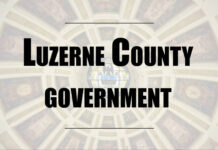In a filing sweep Wednesday, Luzerne County Court of Common Pleas judges outlined their rationale for denying election ballot tallying requests from both Republican 117th House District state representative contenders.
The race has no official nominee a month after the April 23 primary. Incumbent Michael Cabell and challenger Jamie Walsh are currently three votes apart, with Walsh in the lead.
County court opinions are required for appeals Cabell and Walsh filed in Commonwealth Court.
Cabell is seeking the tallying of one paper provisional ballot and rejection of another. On Wednesday he also appealed a county court ruling denying the counting of Republican write-in ballots cast for him, if there are any in his race.
Walsh is trying to overturn a county court decision denying his request to throw out six already-tallied mail ballots because the voters did not fill in the last two digits of the year on the outer envelope.
Wednesday’s opinions were filed by the three-judge panels that presided over these cases. County Judges Tina Polachek Gartley and Richard M. Hughes III served on all panels. Judge Fred A. Pierantoni III was on the panel for both Cabell filings, while Judge Lesa S. Gelb was the third judge on the panel adjudicating Walsh’s filing.
Lake Township
Cabell argued township voter Timothy J. Wagner’s provisional ballot should not be counted because he did not sign the outer envelope a second time when handing it in at the polling place.
According to Wednesday’s county judicial opinion:
Wagner said he completed the provisional with procedural instruction from a poll worker and testified “unequivocally, that he intended to and believed that he did cast his vote in the 117th District nominating contest for Jamie Walsh.”
Wagner could not remember if he signed the outer envelope.
Section 1210 of the state’s Election Code says a provisional ballot should not be counted if one of the two signatures is missing.
In reviewing the board’s decision, the county judges were “mindful of those election law principles long-recognized by our appellate courts, including by the Commonwealth Court.”
They cited a 2002 Commonwealth Court opinion (Dayhoff v. Weaver) that provided two interpretations of the Election Code’s purpose. While it must be strictly enforced to prevent fraud, the law’s purpose was “to protect, not defeat, a citizen’s vote.” It further notes the Supreme Court has “directed that technicalities should not make the right to vote insecure, but instead, the statute should be construed to indulge that right.”
The county judges said the Pennsylvania Supreme Court “has repeatedly recognized the need to construe the Election Code liberally in favor of enfranchisement where fraud is not an issue and a voter’s intent is clear.”
Wagner’s ballot should be counted because there was no assertion of fraud and his intent “was made exceedingly clear by his credible testimony,” the judges said.
Butler Township
The Butler Township provisional ballot Cabell wants tallied was cast by his cousin, Shane O’Donnell.
The county Election Board had rejected this ballot as part of a batch from people not registered to vote in the county.
Cabell’s attorney, Shohin H. Vance, had argued O’Donnell’s ballot should be counted because he did not officially relocate to McAdoo borough in Schuylkill County until March 29, and there is a 30-day window to vote at a prior residence preceding an election.
County Assistant Solicitor Gene Molino, representing the Election Board, had said he would agree with Vance’s interpretation if O’Donnell had not registered to vote in McAdoo in December 2023.
O’Donnell said he changed his vehicle registration to the McAdoo address in December but was surprised to learn he was no longer registered in Butler Township on Election Day. He testified he did not recall checking any boxes on the vehicle registration that would also change his voter registration address.
County Acting Election Director Emily Cook had testified motorists must click on a box on the state transportation department vehicle registration renewal site if they don’t want to change their voter registration address while updating their vehicle registration address.
The county judges said Wednesday:
When assessing the Election Board’s decision, the judges again considered state appellate court decisions that “favor enfranchisement where there is no evidence of fraud and a voter’s intent is clear.”
However, the record in this case clearly demonstrates “no danger of disenfranchisement exists” when voters attempt to vote in the municipality of a former residence “while fully possessing the ability to instead cast a vote in the municipality of their current residence.”
“But for O’Donnell’s decision not to attempt to cast a vote in McAdoo, nothing prevented O’Donnell from exercising his franchise in the place of his residence and active voter registration for the April 23, 2024, primary election,” the county judges wrote. “As the decision of the Election Board not to accept the O’Donnell ballot has visited upon O’Donnell no actual disenfranchisement, we find no fault with and affirm the decision of the Election Board.”
Write-ins
Vance and Molino had presented differing legal analysis on whether the 22 Republican write-in votes in this race should be itemized and credited toward the tally for a candidate already appearing on the ballot.
The election board has long held the position the law allows voters to select someone named on the ballot or write in the name of someone else.
Vance had argued the board’s refusal to review and cumulate write-in votes must be reversed because “that decision contravenes clear precedent from the Pennsylvania Supreme Court.”
Molino has said that ruling no longer matters because state legislators subsequently adopted standards developed by the Voting Standards Development Board on what constitutes a vote that include not counting write-ins for candidates when they appear on the ballot in a race.
Wednesday’s opinion deciphers both positions and concluded write-in votes are invalid for a candidate whose name appears on the ballot.
Mail ballots
The six ballots Walsh wants uncounted were cast by voters who filled in the correct month and day on the outer envelope but failed to add “24” in the blank boxes at the end of the year.
As part of a state redesign of mail ballots that took effect in all counties for this primary, the “20” start of the year was pre-filled, but voters were supposed to write in “24” at the end.
The county Election Board voted 4-1 to accept the six ballots as part of a batch of 111 mail ballots missing only the last two year digits. Most of the six mail ballot votes were for Cabell based on the tally update.
Representing Walsh, Attorney Gregory H. Teufel had argued a full date is required by law.
Wednesday’s opinion acknowledges a 2023 Supreme Court decision (Ball v. Chapman) that held county election boards should not count ballots that were undated or incorrectly dated. That would include those outside the date range in which issued ballots could have been available and cast, which was April 1 through April 23 for the primary, it said.
In this case, each of the 111 ballots at issue contained an in-range month and day and the pre-printed “20” start of the year, it said.
“In finding the ballots were valid, this court does not believe the decision, in any way, is inconsistent with the ruling of our Supreme Court in Ball v. Chapman,” the opinion said.
The outer envelope with the pre-printed 20 was specifically produced for the 2024 primary election and “therefore, it would stand to reason that the date, as written, could only be for the calendar year 2024,” the opinion said.
“Accordingly, each ballot had a correct date evidencing when the voter signed the ballot,” the opinion said, noting the county Election Board also followed Pennsylvania Department of State guidance that such ballots should be counted.
The opinion also stated no fraud is alleged with these ballots and cited the Commonwealth Court Dayhoff opinion, observing “there is a delicate balancing act that must be applied between protecting a citizen’s vote and satisfying the terms of the Election Code.”
Reach Jennifer Learn-Andes at 570-991-6388 or on Twitter @TLJenLearnAndes.




